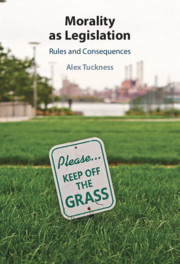Book contents
- Morality as Legislation
- Morality as Legislation
- Copyright page
- Dedication
- Contents
- Acknowledgments
- Abbreviations with Method of Citation
- Introduction
- Part I The Emergence of the Rule-Consequentialist Paradox
- Part II Contemporary Approaches to the Rule-Consequentialist Paradox
- Chapter 6 Four Contemporary Options for Resolving the Paradox
- Chapter 7 A Hybrid Defense of the Legislative Perspective
- Works Cited
- Index
Chapter 7 - A Hybrid Defense of the Legislative Perspective
from Part II - Contemporary Approaches to the Rule-Consequentialist Paradox
Published online by Cambridge University Press: 29 July 2021
- Morality as Legislation
- Morality as Legislation
- Copyright page
- Dedication
- Contents
- Acknowledgments
- Abbreviations with Method of Citation
- Introduction
- Part I The Emergence of the Rule-Consequentialist Paradox
- Part II Contemporary Approaches to the Rule-Consequentialist Paradox
- Chapter 6 Four Contemporary Options for Resolving the Paradox
- Chapter 7 A Hybrid Defense of the Legislative Perspective
- Works Cited
- Index
Summary
The best option for defending the use of the legislative perspective is a hybrid approach that includes both consequentialist and nonconsequentialist commitments. Given that the theory in its original theistic form combined nonconsequentialist religious commitments with weak consequentialist reasoning, a successful adaptation of the legislative perspective to appeal to contemporary secular audiences will need to address both types of moral commitments. The type of legislative perspective under consideration is one that is moderate in its strength, realistic, at least weakly consequentialist, and applies to counterfactual cases where one is not literally legislating. The six moral commitments that one must endorse in order to use the legislative perspective in the specified sense are plausible, but they require a hybrid approach that is neither solely consequentialist nor exclusively nonconsequentialist. The nonconsequentialist reasons that justify the shift to the legislative perspective are stronger in cases where people are making decisions in political contexts, even if those contexts are not legislative contexts.
- Type
- Chapter
- Information
- Morality as LegislationRules and Consequences, pp. 190 - 216Publisher: Cambridge University PressPrint publication year: 2021



